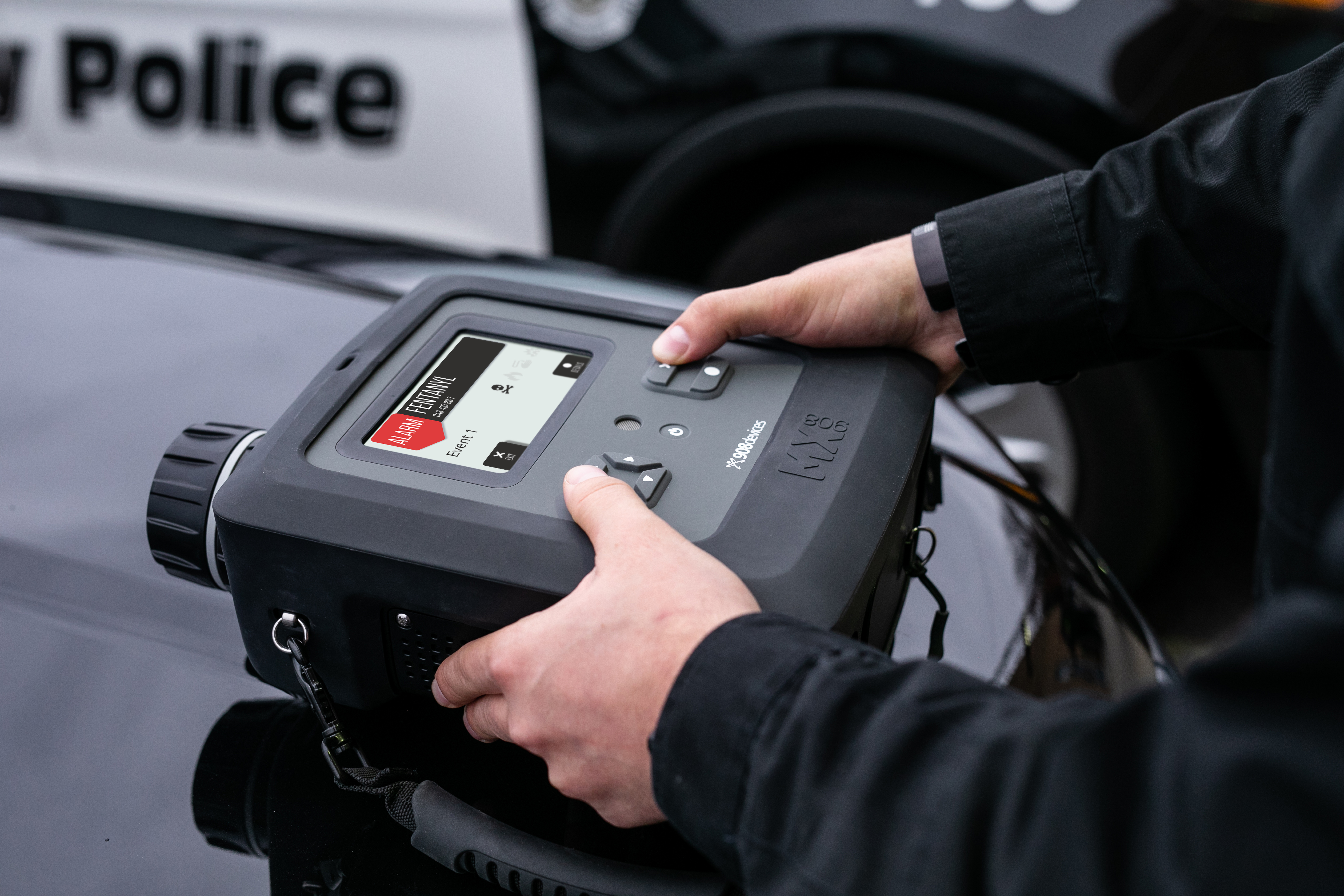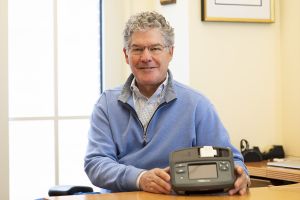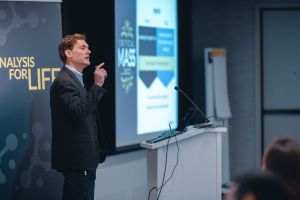A UNC Chemist and Savvy Startup Spark a High-Tech Assault on National Drug Trafficking

The MX908, developed by UNC chemist J. Michael Ramsey and 908 Devices, Inc., combines thermal desorption, chemical ionization and tandem mass spectrometry to detect hundreds of analytes at trace levels including illicit drugs, such as fentanyl, explosives and other threats.
June 24, 2025 | By Dave DeFusco
Two decades ago at UNC-Chapel Hill, a chemist fiddled with ion traps and high-vacuum systems, nudged by a question: What would happen if arguably the most powerful chemical detection tool in the world—mass spectrometry—could be shrunk to fit in the palm of your hand? Today, the answer is saving lives.
The MX908, a handheld mass spectrometer developed by 908 Devices Inc., is now deployed across the United States to fight the fentanyl crisis and detect chemical threats at borders and in local communities. Its origin story begins not in Silicon Valley, but in the UNC Department of Chemistry with Professor J. Michael Ramsey, and reaches its commercial realization under a small group of founders at 908 Devices, including Dr. Kevin Knopp, co-founder and CEO.
Ramsey, a National Academy of Engineering member and pioneer in microfluidics, recalls the first inklings of the idea while at Oak Ridge National Laboratory in the mid-1990s. He had already launched one company—Caliper Technologies—that developed seminal microfluidics products and began asking a radical question: What else can we shrink? The answer was mass spectrometry.

Ramsey and his students and postdocs began experimenting with miniaturized ion traps, exploring their theoretical performance at pressures orders of magnitude higher than traditional systems. A postdoc’s accidental success operating an electron multiplier at higher pressures than he should have opened the door to what would become High Pressure Mass Spectrometry (HPMS). When Ramsey moved to UNC in 2004, he found a welcoming environment for innovation.
“UNC was very supportive of spinouts,” he said. “It was easier to form a company here than at Oak Ridge.”
The commercial leap came when Ramsey reconnected with Knopp, a successful entrepreneur who was a co-founder of Ahura Scientific, which was sold to Thermo Fisher Scientific in 2010. The two had collaborated previously on an NIH project. “We already knew each other and shared common values, which is crucial for co-founders,” said Ramsey.
In 2012, they launched 908 Devices, and Knopp took the reins as CEO. From the start, he said the UNC connection was key. “Before day one of 908 Devices, we were working with Mike Ramsey,” he said. “We looked at technologies from around the world. What we found in Mike’s lab at UNC was so unique, we built the company around it.”
According to Knopp, Ramsey’s lab wasn’t just the source of ideas but also people. “Mike had a prolific lab, and many of his postdocs and students came over to 908 Devices. I can think of at least six to 10 who transitioned over time,” he said.
Transforming an academic prototype into a rugged field device was no small feat. “We had to work on every component: pumping systems, electronics, packaging,” he said. “Then we had to bring all those together in a battery-powered, field-ready form factor.”

The MX908 combines thermal desorption, chemical ionization and tandem mass spectrometry to detect hundreds of analytes at trace levels including illicit drugs, such as fentanyl, explosives and other threats. Users place a swabbed sample under a lid, where it is heated and analyzed. Results appear in under a minute. But what makes it revolutionary is the user interface.
“Most of our customers don’t even know there’s mass spectrometry in the box,” said Knopp. “They see a named compound and next-step guidance. It’s not squiggly lines, it’s actionable information.”
The MX908 is now deployed in over 55 countries and used by agencies ranging from the Texas Department of Public Safety to U.S. Customs and Border Protection, and even Romanian customs. “We have about 600 accounts worldwide and nearly 3,000 mass spectrometers in the field,” he said. “It’s amazing to see this go from a lab idea to a global public safety tool.”
In Texas, where fentanyl deaths surged 158% from 2020 to 2023, the device has become essential. “It provides a lab-grade answer in the field,” he said. “Whether it’s a police officer, firefighter or mailroom worker, they need immediate, accurate results to make critical decisions.”
The partnership between 908 Devices and UNC remains strong. “The reason I was very willing to have this conversation is because of how amazing our 13-year partnership with UNC has been,” said Knopp. “From Chance Rainwater in UNC’s Office of Technology Commercialization to researchers like Mike Ramsey, it’s been an enabler of our entire journey.”
Rainwater said the partnership brought together a rare mix of strengths that often don’t align in university spinouts: the scientific ingenuity and entrepreneurial drive of faculty founders like Ramsey, the business savvy and operational leadership of Knopp and the 908 Devices team, and the intellectual property guidance and support of the university’s commercialization office. He said the combination created a solid foundation not just for a successful launch, but for long-term impact.
“Mike Ramsey combines world-class science with a genuine commitment to solving real-world problems, and he understands that commercialization requires engagement with business leaders beyond the university,” said Rainwater. “The 908 Devices team takes a collaborative approach with OTC to find solutions to issues related to UNC intellectual property rather than treating them as obstacles.”
Knopp believes university chemistry departments like UNC’s have a crucial role in national security. “Academic labs can tackle big ‘R’ research—proving the hard things—while companies like ours handle the big ‘D’ development,” he said. “You need both.”
In March, 908 Devices sold its bioprocessing desktop portfolio to Repligen Corporation to focus entirely on its handheld platform. “We called it the launch of 908 2.0,” he said. “We now have four handheld products, including new optical spectroscopy tools, giving our customers a full toolkit.”
The mission is clear: equip frontline workers with fast, reliable and robust chemical analysis tools. “The fentanyl crisis is a national emergency,” said Knopp. “But this extends to homeland and military threats, too. If fentanyl is aerosolized, it’s no longer just a drug problem. It’s a weapon.”
Looking ahead, Knopp sees continued growth. “The need is enormous,” he said. “From trace gases to carcinogens affecting firefighters, we’re building tools that can protect lives right at the point of need.”
Knopp has a final message for UNC students and faculty eyeing the entrepreneurial path. “Be passionate. Understand the customer. Think beyond the lab,” he said. “Even when you’re working on the fundamental science, always ask: Where could this go? Who could it help?”

